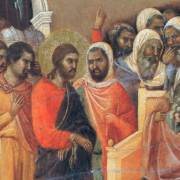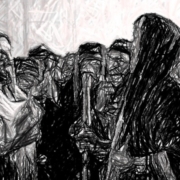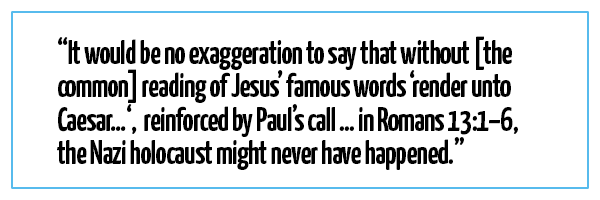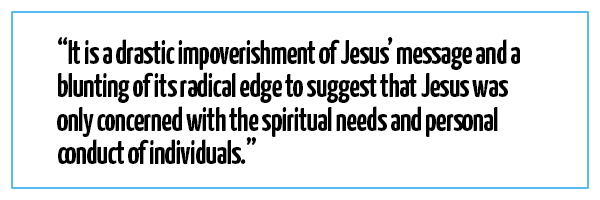Prayer as a Weapon: Clasped Hands as Nonviolent Uprising
Matthew Anslow | Tuesday, 23rd June 2015
Last month Matt Anslow delivered the Tinsley Lecture, the annual public lecture of Morling College's Tinsley Institute on mission, evangelism and ethics. His topic was Prayer as a Weapon: Clasped Hands as Nonviolent Uprising.
Transcript
“To clasp the hands in prayer is the beginning of an uprising against the disorder of the world.” (Karl Barth)
On March 21 a group of nine Christians, myself included, held a peaceful prayer vigil in the office of Australian Immigration Minister Scott Morrison. We were praying about and protesting the inhumane asylum seeker policies of the Australian government.
Five of the group were eventually arrested for trespassing, though the charges were later dismissed in court. A similar vigil has subsequently been held in Foreign Minister Julie Bishop’s office.
Our act of civil disobedience, taking the form of public prayer, generated numerous responses. We have received much support—far more, in fact, than we would have expected—from church leaders, people of all different faith traditions, atheists, and media.
Our action also attracted its fair share of disapproval, ranging from personal abuse to theological diatribes. Much of this centred on our use of prayer.
On the one hand were the fashionable and cheap shots taken at us by some atheists, those who ridicule the practice of prayer without, apparently, understanding what prayer actually is. (This is in contrast to those atheists who have shown a deep respect for our action, some having even attended our recent public prayer vigils, despite that it stems from a worldview they do not themselves hold.) One contrarian, in a comment on a Huffington Post report of our action, exemplified the kind of inanity I am talking about: “Well they should have been arrested for thinking that prayer was going to do anything at all.” Such a comment betrays a common assumption that prayer has only instrumental value for Christians.
On the other hand were those Christians who, in addition to quoting (largely without a sense of context) parts of Romans 13:1–5 and Matthew 6:5–8, asserted the private nature of prayer, to the exclusion of public expressions such as demonstrated by our action. (Admittedly this is even more puzzling given that many of the same people would be dismayed by talk of the removal of The Lord’s Prayer from the opening of Parliament.)
In what follows I want to argue for a silhouette vision for prayer in the public sphere as an alternative to both ‘unscientific’ instrumentality and private piety.
I do not expect what I will write will be convincing to those who do not share my worldview; I accept this out of hand. After all, as Stanley Hauerwas has suggested, “Christians must live in a manner that their lives are unintelligible if the God we worship in Jesus Christ does not exist” (emphasis mine). It would be unreasonable to expect people with very different assumptions about the world to agree with me. Likewise, it would be equally unreasonable to subject prayer to a legitimating standard based on assumptions that those who practise prayer do not necessarily hold.
I do, however, hope to open up a different conversation about some unknown or neglected aspects of prayer, both amongst those who do not believe prayer has any ‘use’, and amongst those who see prayer as entirely or even primarily a private affair. I deem this to be a worthwhile conversation given the number of recent acts of prayerful protest, such as that undertaken by our group, those at Whitehaven’s new mine at Maules Creek, and the ongoing Swan Island Peace Convergence.
Prayer as alternative language
In George Orwell's well-known story Nineteen Eighty-Four one of the values of the ‘Party’ that governs the fictional nation of Oceania is ‘Ignorance is Strength.’ Ignorance, in the form of falsified history, becomes a value because of its ability to control subjects through destroying memory and thus independence.
One of the ways in which such ignorance is achieved amongst the populace is the rewriting of language in the form of “Newspeak.” In this rewriting of language it is not that new words are invented, but rather that old words are destroyed, and retained words stripped of any secondary meanings that are deemed to be undesirable (“unorthodox”) by the Party. The effect of such a reduction in language is the limitation of critical thought. This is made abundantly clear to Winston, the main character, by his friend Syme:
In your heart you'd prefer to stick to Oldspeak, with all its vagueness and its useless shades of meaning. You don't grasp the beauty of the destruction of words. Do you know that Newspeak is the only language in the world whose vocabulary gets smaller every year? ... Don't you see that the whole aim of Newspeak is to narrow the range of thought?
In other words, inasmuch as thought itself is based on words and language, the redefinition and reduction of language suppresses thought. Control of language, then, has the very real potential to cause an epistemological crisis, not merely for an individual, but for a society. None of this is to make a case for or against a Wittgensteinian understanding of vocabulary and truth (“The limits of my language means the limits of my world”); rather, it reminds us of the vast influence of language on thought and knowledge. Vocabulary, at the very least, forms a foundational framework for how we conceive of reality and, most pertinently for us, ethics.
The act of prayerful civil disobedience that my friends and I committed was in response to an issue about which thought and knowledge have been co-opted by drastic shifts in language. Think of terms and phrases like ‘Illegals,’ ‘border protection,’ and ‘tougher policy.’ What do these mean in the context of the asylum seeker issue, and how have they been changed for this purpose? The notion of tougher policy is an interesting example. When I was a child I was taught that to be tough meant to stand against bullies and perpetrators, not the weak and desperate. How language changes…
Much ink and many pixels have been spent in discussing these and other uses of language in regard to asylum seekers, and I will refrain from repeating such discussion. Wherever our language has come from, what we have now is a set of incoherent language forms—not unlike the absurd ‘Ignorance is strength’—that have shaped the very attitudes, the very conception of reality, of a good portion of the Australian population regarding asylum seekers.
Of course, such issues of language and epistemology are not restricted to the issue of asylum seekers. In his 1978 essay ‘Agricultural Solutions for Agricultural Problems,’ farmer and poet Wendell Berry notes the industrialisation of our language:
Now we do not flinch to hear men and women referred to as ‘units’ as if they were as uniform and interchangeable as machine parts. It is common, and considered acceptable, to refer to the mind as a computer: one’s thoughts are ‘inputs’; other people’s responses are ‘feedback.’ And the body is thought of as a machine; it is said, for instance, to use food as ‘fuel’; and the best workers and athletes are praised by being compared to machines.
The effect of this “revolution of language” on our values has been profound according to Berry, since it has shifted our very images of life and work from being organic to mechanised. It is no wonder then, he thinks, that our food systems have become polluted and exploitative. The same problems of language could be exported, in one sense or another, to any of the major issues faced by humanity.
What has this all to do with prayer? My contention is that prayer should not to be viewed in a reductive way that sees it primarily in instrumental terms as a petitionary means to seek a desired outcome. While petition is indeed a component of prayer, at least as Jews and Christians understand it, it is not in the crude cause-and-effect sense assumed by most detractors of religious devotion. If we can speak of prayer having an instrumental element, it is the almost the opposite of what is commonly assumed. The aim of prayer is not primarily to change things ‘out there,’ since before we pray God knows what we need and his grace is abundant. On the contrary, prayer is instrumental inasmuch as it changes the one who prays.
Prayer is, in part, a retraining in language. By introducing and socialising people into a new vocabulary, prayer shifts the framework of thought and perception, since to make a habit of some form of language necessarily changes our thinking and perception. Such habits are slow transformations, much as rocks on a beach smoothed by waves over time. Prayer is such a habit. This in itself is not unique to prayer, since any new language set achieves an equivalent shift. But this is striking in regards to prayer for at least two reasons: first, prayer is rarely, if ever, thought of this way in the public sphere; and second, the language of prayer is, for Christians, fundamentally revelation.
After all, Christians do not actually know how to pray. That is the Scriptural testimony, at least; it is in fact the Spirit of God who knows how to pray (Romans 8:26), and, as Sarah Coakley has said, “The Spirit is always there, closer to us than we are to ourselves, closer than kissing, constantly begging permission to pray in us.” The language and habit of prayer is only possible because of the Spirit. This is important because it guarantees that genuine prayer is not the will to power.
Prayer as the Seed of Revolution
But it is not only that we do not know how to pray, but we also do not know what to pray. What is the content of this new language? For Christians, what we are to pray is taught to us by Jesus in the Lord’s Prayer (Matt 6:9–13). All genuinely Christian prayer is derived from the Lord’s Prayer—“A disciple’s prayer is founded on and circumscribed by it,” (Bonhoeffer). In the context of the first century this prayer represented language that was at once liberating and unprecedented—a unique habitual set of language.
To begin with, the address of the prayer to ‘Our Father’ relativises all human relationships— before and above all other socially constructed roles, we are all siblings and therefore fundamentally equal. This address also thwarts any attempt to make the object of ultimate loyalty and devotion something less than the Father of all people, an obvious subversion of the Pater Patriae, the Roman emperor (‘Father of the fatherland’), and the temporal political realities he symbolises.
To pray “your kingdom come” is to reject the pretensions of all earthly kingdoms, structures with universalising ambitions that inevitably coerce and violate. It is to reject those [dis]orders that do not conform to the will of God. It is to be a person incorporated into a community shaped to participate in a new world that is unimaginable without revelation.
What is this new world? What is God’s will? Apparently its nature is reflected in daily bread for all and forgiveness of debts. Those shaped by such prayer over time learn to imagine an economics in which there is enough for all. Moreover, to make forgiveness a form of habitual language, and thus a pattern of thought, revolutionises human interactions, subverting expectations of retribution and favouring humility and the offer of merciful embrace.
Lastly, to ask that God “lead us not into temptation, but deliver us from evil” recognises that we are not to cut ourselves off from the world. We remain in the world and we have responsibilities within it, but we are not to ignore or succumb to the evils in it.
Such language is able to reshape the one who prays the prayer. They can come to embody an alternative reality to that reflected by nationalism, violence, greed and retribution. Prayer in the manner of the Lord’s Prayer can never be a merely private affair: it always has public and political implications. Prayer rearranges our very desire, and in doing so drives us to action. As Karl Barth says, “God, resists the torrent of human injustice and evil, and therefore . . . (Christians) cannot cease to oppose it as well in their own place and manner.”
When my friends and I prayed as an act of public protest against inhumane asylum seeker policies, what we are attempting to symbolise is that we are complicit in the problem. We are those whose desires need to be transformed through ongoing prayer, and in seeking to publicly dramatise this we hope to invite others (including the Immigration Minister) on the same journey, not for our sake, but for the sake of the more than 1000 children in detention.
If prayer is a weapon, an uprising against the world’s disorder as Barth says, it is a weapon that that we turn on ourselves as those disordered. In this sense prayer is a public act since the world is witnessing a moment in the needed transformation of our world and are thereby invited to take part. It is the seed of a nonviolent revolution.
I take Barth’s insistence that prayer is the beginning of a kind of uprising to be true. The act of prayer—including forming an alternative set of language habits to the world and relinquishing the will to control—is indeed radical, a kind of uprising. But what is implied here by ‘uprising’ is unique. Uprisings tend to imply a will to power, but prayer as uprising is the making of the purposes and will of another (namely, God) our own. Such an act of humility is a sign of openness to guidance and reconciliation.
Prayer as alternative historical consciousness
The phrase from the Lord’s Prayer that I left unexamined above is the second petition: “Hallowed be your name.” The act of prayer is an acknowledgement that we are not ‘ultimate’ in any sense. To pray that God’s name is hallowed is not for God’s benefit—God is already hallowed. Rather, it is for our benefit, and the benefit of the world.
If prayer is to acknowledge that we are not ‘ultimate’, this implies that it is not our responsibility to generate a plan for history. And this is indeed good news, since all such historical goals eventually de-escalate into coercion for the so-called ‘greater good’. Genuine prayer, as a relinquishment of the necessity to assert such control, is the rejection of violence and coercion as a historical tool.
Prayer is, in a sense, an anti-weapon. It is the act of seeking to align ourselves to God’s plans for history, as Christ has done. And like Christ, the one who prays must be willing to embrace suffering as the only way of determining the meaning of history. In the words of John Howard Yoder, “The relationship between the obedience of God’s people and the triumph of God’s cause is not a relationship of cause and effect but one of cross and resurrection.” Or as Tom Wright puts it, in prayer we “resonate with the pain of the world” because the Spirit of God who dwells in us also groans from within the heart of the world. In this way we get in touch with the living God who is doing a new thing. Prayer in the manner of Christ construes the meaning of history very differently to the powers-that-be.
Prayer is the willingness to be patient and to renounce imposing our own desires on others. It is part of what Yoder calls “the readiness to renounce our legitimate ends whenever they cannot be attained by legitimate means.” This does not exclude the possibility of confrontation, though confrontation is always accompanied by a readiness to forgive.
The action of my friends and I was hopefully a genuine expression of such patience. We did indeed engage in a confronting act, though we sought to invite rather than coerce those who were most responsible for the evil being protested. For us prayer was the most pertinent act in this circumstance because to protest on the basis of our own historical desires would indeed be coercive. Praying was a sign that we did not ultimately represent ourselves qua agents of change, but rather as those trying to be obedient to the will of God.
This, somewhat ironically, gets at the heart of Matthew 6:5–8, a passage that was continuously lobbed at us after our public prayer actions. The problem Jesus addresses here is not praying in public per se, but rather the use of prayer as an instrument for attaining social honour. To do such would be to seek after a reality where the one who prays is esteemed, rather than God and God’s reign over history. If, however, public prayer genuinely seeks the will of God and not the one who prays, then it becomes part of the activity of what Bonhoeffer calls “the Visible Community,” a community that seeks to display to the world a life of good works that glorify God (cf. Matthew 5:13–16).
---
Prayer is the beginning and means of a reorientation of human relationships around divine love and freedom as embodied in Christ.
This is one of the reasons why Christians pray in relation to asylum seekers, or any social issue facing humanity. It is only in recognising and confessing our own complicity in evil and the taintedness of our very desires that we can hope to be freed from these forces. A will conformed in prayer to that of the loving, suffering, nonviolent Christ is required to work towards the transformed relationships necessary for sustainable social change.
Such a transformed will can never be passive in the face of evil, as the God of Jesus Christ is not. For this reason prayer cannot simply be private. But such a transformed will can also never be coercive in response to evil, as the God of Jesus Christ is not. For this reason prayer cannot simply be instrumental.
On the contrary, prayer is a weapon that turns upside down the very notion of weapons, the very notion of history, and the very notion of humanity.
Matt Anslow is married to Ashlee, works for an international development NGO, is a PhD candidate in theology at Charles Sturt University, and is an organiser for #LoveMakesAWay. He and Ashlee live in a small [un]intentional community in Sydney where they try to put their convictions into practice in the context of the mundane. Matt is also an editor of On The Road. You can follow him on Twitter.





 There is no time to exegete either of these two passages in detail here.
There is no time to exegete either of these two passages in detail here. To sum up thus far: Once we cast off the modern blinkers we bring to the gospel story, it becomes clear that Jesus’ message of the dawning kingdom of God had significant political implications. His announcement that God’s long awaited reign was now asserting itself in the world, and his consequent summons for people to rally to the flag, had, as Wright observes “far more in common with the founding of a revolutionary party than with what we now think of as either ‘evangelism’ or ‘ethical teaching’”.
To sum up thus far: Once we cast off the modern blinkers we bring to the gospel story, it becomes clear that Jesus’ message of the dawning kingdom of God had significant political implications. His announcement that God’s long awaited reign was now asserting itself in the world, and his consequent summons for people to rally to the flag, had, as Wright observes “far more in common with the founding of a revolutionary party than with what we now think of as either ‘evangelism’ or ‘ethical teaching’”.